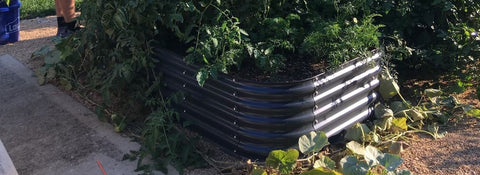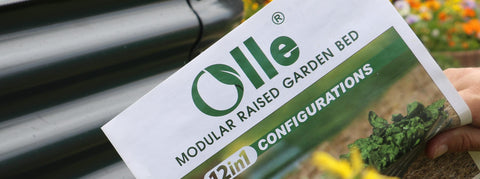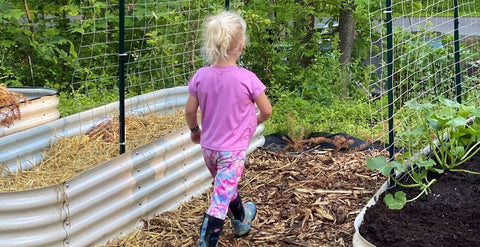Knowledge from Olle Garden Bed: What Plants Are Good For Tomatoes
We will cover all the best plants you can grow with tomatoes to prevent pests and diseases.We will introduce each plant in detail and highlight what makes them useful for preventing pests or diseases.There are also some considerations about which plants should not grow tomatoes. The following content also has some reference value for raised garden beds.
sweet basil
Basil is an efficient companion plant for tomatoes. They help drive away mosquitoes, fruit flies and many other kinds of flies. Basil also attracts bees, which helps pollinate, but does not attack tomatoes.
Basil is also close to tomatoes because they have complementary roots. Tomatoes are said to have deep roots, while basil can survive in just eight inches.
Coloured glaze
Borage, also known as star flower, is another good companion plant of tomato plant. It is very effective in driving away pests, especially the tomato hornworm.
Like basil, borage helps attract bees.
Borage can grow to an average height of 18-36 inches, which can provide a good shade for your tomato plants.

Leek
Chives help drive away many insects, including aphids. Aphids are common pests that can damage tomato crops.
Chives are relatively easy to grow. If they get enough sunlight, they will last for several years.
Chives work well around the edges of tomato plants and can act as a barrier. They have a strong smell, so they can drive away pests and act as bait for pests to find food.
Dill
Dill is another choice as a companion plant. Immature dill has the ability to drive away aphids and hornworms. However, as dill continues to grow, it may begin to negatively affect the growth of tomato plants.
You might want to plant borage and dill with tomato plants, so they won't be attacked by hornworms.
Garlic
Garlic is another popular companion of tomato plants. It is especially good for fusarium wilt and spider mite. However, the smell of garlic is a major deterrent to the insect world, which means that other insects, such as aphids and other beetles, are also less enthusiastic.

Garlic also has certain benefits, because its protective ability can also drive pests out of the soil. In addition, putting garlic bulbs into the soil will also help improve the flavor of tomatoes.
Geranium
Pelargonium is a good general insecticide. They have been found to repel worms, beetles, spider mites and leafhoppers.
Leafhoppers are small insects, usually green, which are integrated with the green leaves of plants.
Marigold
This is not a plant, but a kind of herbal medicine. Because of its strong fragrance, it helps to reduce pests. Common pests are driven away, including aphids, hornworms, thrips and whiteflies.
Thrips can become carriers of various plant diseases, so some marigolds can create miracles.
Tagetes erecta can also provide some protective properties, which can prevent some root diseases, such as root knot.
Mint
This aromatic plant repels aphids and cabbage moths, ants, rodents, flea beetles and other leaf beetles.

Mint is known as an invasive species that grows very fast, so it should be carefully monitored to ensure that it does not take over the garden completely.
globeflower
Also known as Indian cress or monk cress, this plant is one of the most obvious examples of companion cultivation. It will provide a lot of benefits for tomatoes and many other plants.
The chemicals in the air from this plant can drive away pests, so they should be planted around the edge of the garden.
This plant will not prevent beneficial insect pollinators such as bumblebees
Oregano
Oregano is a popular cooking herb and a good companion of tomatoes. It usually attracts many pollinators.
parsley
Parsley is not well adapted to all kinds of tomatoes, but it can attract suspended flies. Generally speaking, flies are harmless to your garden, but they will prey on aphids, which may cause great problems for tomato plants.
Another role that companion plants can play is to lure certain pests away from your tomato plants. For example, parsley can capture crops to attract aphids rather than tomato plants to attack them.

thyme
Thyme has a remarkable effect when planted near tomatoes. Like other herbs used as companion plants for tomato plants, thyme can help improve the taste of tomatoes while preventing insects from entering.
Some companion plants will attract useful insects or birds, which can help pollinate your garden. In turn, these can prey on destructive pests on tomatoes, reduce their number, and thus reduce their impact.
For a healthy garden, a large number of flowers and herbs are the key. When you have a lush garden with many complementary species, it can attract pollinators, birds and beneficial insects, which will help your tomato plants grow to their full potential.
Avoid or remove these undesirable companion plants
Cabbage, corn, solanaceous plants, such as pepper, potato and eggplant, are harmful to the good growth of tomato plants.
This is mainly because various forms of wilt of these plants may pollute your tomato plants.
Cabbage and other plants in the family, such as kale and broccoli, will have a negative impact on the growth of tomato plants, so they should be avoided.
Corn and tomato have some similar pests, so they may bring disaster to your garden.
Both fennel and walnut can secrete substances harmful to the garden.
Specifically, the chemicals produced by walnut trees are toxic to tomatoes.
